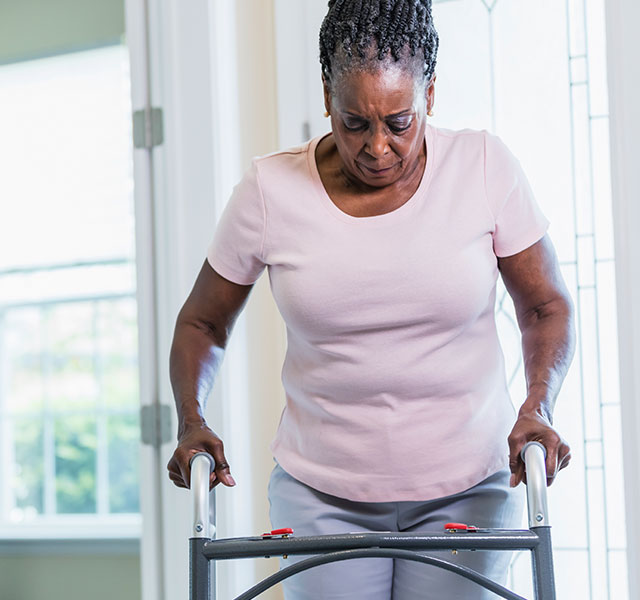Osteoarthritis, also referred to as degenerative joint disease, affects more than 32.5 million Americans, according to the Centers for Disease Control & Prevention (CDC). Osteoarthritis occurs when the cartilage in your joints gets worn down, which is why it’s most common in older people.
“I always use a car analogy,” says Eddie El-Yussif, DO, FAAOS, an orthopedic surgeon at Henry Ford Health. “It’s like a tire—when you use the tires in your car over a long period of time, the tire wears out and that’s kind of how it is with the cartilage on the end of your bones.”
Here, Dr. El-Yussif answers common questions about osteoarthritis.
Q: What are the risk factors for osteoarthritis?
A: Age is a risk factor. The most common age group we see it in is 60- to 70-year-olds, but it can occur in people as young as 40. There may be a genetic predisposition to getting osteoarthritis if your family members have it. However, the genetic mechanisms are unknown.
Obesity is also a major risk factor for osteoarthritis. Being overweight puts more pressure on the joints and causes cartilage to wear down. Osteoarthritis is more common in women than men, though it’s not known exactly why. Also, overusing a joint—especially while engaging in high-impact activities on the job or when playing a sport—can be a risk factor for developing osteoarthritis.
Q: Is there anything you can do to prevent osteoarthritis in the first place?
A: While nothing is a guarantee, maintaining a healthy weight and exercising regularly (low-impact exercise is best) can help preserve your joints.
Q: What are the symptoms of osteoarthritis?
A: Symptoms generally begin mildly and become more severe over time. Pain, joint stiffness, tenderness and limited range of motion are common symptoms. You might also hear a cracking (also called crepitus) when you move your joints. As the arthritis progresses, you may get bone spurs or changes in knee alignment. If you think you have osteoarthritis, your doctor will refer you to an orthopedic specialist who can diagnose it with physical exam and radiographs.
Q: How is osteoarthritis treated?
A: Treatment falls into two categories: non-operative and operative. We always try non-operative treatment first, which consists of taking over-the-counter anti-inflammatory medications as long as the patient doesn’t have stomach or kidney problems. We also recommend physical therapy. While it doesn’t replace the cartilage, it helps ease symptoms by strengthening and stretching the muscles. Knee braces and assistive devices such as canes and walkers are also treatment options, which help take pressure off the joints. If needed, weight loss is also an important non-operative treatment.
Injections are also a common non-operative treatment. On average, anti-inflammatory cortisone injections last two to three months while viscosupplementation (shots that lubricate the joints) can last up to six months. The efficacy of injections vary from person to person. Lubricating shots are less effective for people who have more severe arthritis—and they’re not recommended for people who have bone-on-bone arthritis.
Joint replacement surgery is the operative option, which is where the cartilage is replaced with implants made up of metal and plastic. Depending where your arthritis is, you may be a candidate for a partial replacement, which generally leads to a faster recovery, less pain and an implant that feels more natural. In some cases, robotic surgeries can be performed, which helps to pinpoint implant positioning and sizing. Joint replacements—whether partial or full—can last around 20 to 30 years and can be life-changing.
Subscribe to receive a weekly email of our latest articles.
To find an orthopedic surgeon at Henry Ford, visit henryford.com/services/orthopedics or call 1-800-436-7936.
Eddie El-Yussif, DO, FAAOS, is an orthopedic surgeon who sees patients at Henry Ford Macomb Health Center – Chesterfield and Henry Ford Orthopedics - Seville in Clinton Township.



